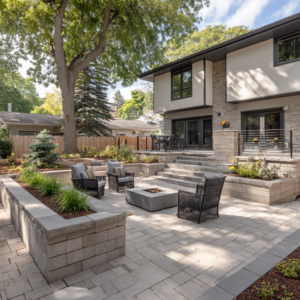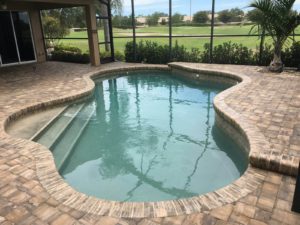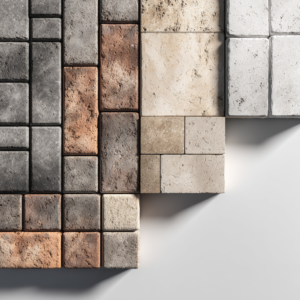When it comes to designing an outdoor pool area, choosing the right materials is crucial to achieving a balance between aesthetics, durability, and safety. Recently, pool porcelain pavers have emerged as a popular choice among homeowners and landscape designers alike due to their exceptional qualities.
In this article, we will delve into the world of pool porcelain pavers. We will explore their features, benefits, installation process, maintenance requirements, and the reasons behind their growing popularity.
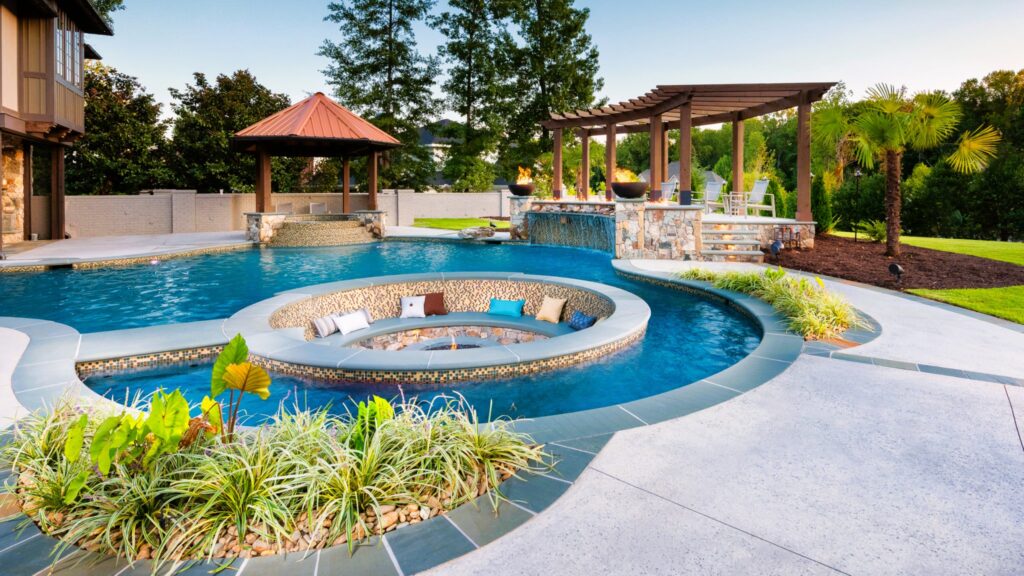
Jump to:
Pool Porcelain Pavers: Understanding Porcelain Pavers
For those who don’t have a lot of experience with hardscape, porcelain pavers might seem like a strange choice for a paver material. The truth is that they are considered one of the best pavers nowadays. Understanding how they are made has everything to do with it.
The production of porcelain pavers begins with the careful selection of high-quality raw materials. Porcelain is made from a blend of fine clays, silica, feldspar, and other natural minerals.
These materials are chosen for their specific characteristics, such as heat resistance, strength, and color variations. Sourcing the finest ingredients ensures the end product will possess the desired qualities.
Once the raw materials are gathered, they are mixed and blended in precise proportions to achieve the desired consistency and color.
The mixture undergoes a rigorous process of pulverization and homogenization to eliminate any impurities and achieve a uniform composition. Water is added to form a paste-like substance known as “slip.”
The slip is then poured into molds to shape the porcelain pavers. These molds come in various sizes and patterns, allowing for a wide range of design possibilities.
The slip is carefully distributed within the molds to ensure even thickness and coverage. Vibrating machines help eliminate air bubbles, ensuring the pavers’ structural integrity.
Next, the filled molds undergo a pressing process to compact the slip and remove excess water. Hydraulic presses are commonly used to exert immense pressure on the slip, facilitating the compaction process. This significantly reduces the moisture content and makes the pavers stronger and more resilient.
After pressing, the pavers are carefully removed from the molds and placed in a drying room. Here, they are subjected to controlled temperature and humidity conditions to gradually remove the remaining moisture.
This slow drying process minimizes the risk of cracking or warping, ensuring the pavers maintain their shape and integrity.
The dried pavers are transferred to a kiln for firing. This is a critical stage in the porcelain paver production process. The kiln subjects the pavers to high temperatures, typically ranging from 1,200 to 1,400 degrees Celsius (2,192 to 2,552 degrees Fahrenheit).
This intense heat causes the minerals within the pavers to undergo a chemical transformation known as sintering. Sintering fuses the particles together, resulting in a dense and durable porcelain material.
Once the firing process is complete, the porcelain pavers undergo a series of finishing steps to achieve their final appearance. These steps may include grinding, honing, and polishing to create smooth surfaces and precise dimensions.
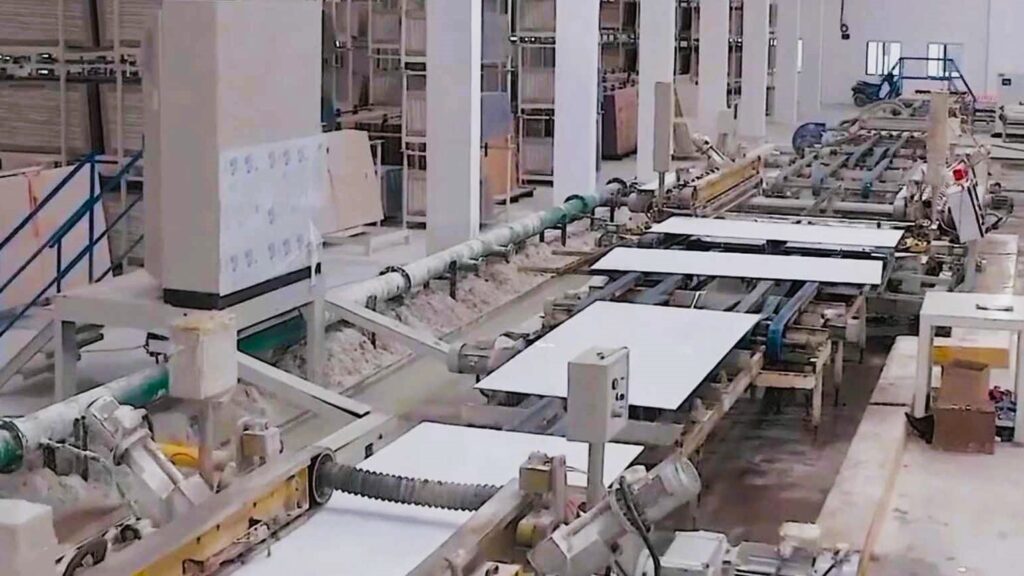
Features of Pool Porcelain Pavers
Pool porcelain pavers are a type of outdoor flooring material specifically designed for use around pools and other water features. They are crafted using advanced technologies, combining the beauty of natural stone with the practicality of porcelain.
Here are some notable features of pool porcelain pavers:
Slip-resistance
When it comes to pool areas, safety is paramount. Accidents caused by slips and falls can be a serious concern. However, porcelain pavers have proven to be an excellent choice for these spaces. They are engineered with slip resistance in mind, providing a secure and reliable surface, even when wet.
Porcelain pavers are crafted with textures that create friction and improve traction. The surfaces can vary, ranging from slightly textured to more pronounced patterns, designed to maximize slip resistance. The texture helps to disrupt the smoothness of the surface, allowing for improved grip underfoot.
In some cases, manufacturers apply specialized surface treatments to further enhance slip resistance. These treatments may involve the application of coatings or additives that increase friction, creating a more secure surface.
The inherent characteristics of porcelain itself contribute to slip resistance. Porcelain is a dense and non-porous material, which means it does not absorb water easily. This quality helps prevent the build-up of water on the surface, reducing the potential for slips.
Durability
Durability is a crucial factor to consider when considering pavers for pools. Pool porcelain pavers are specifically engineered to withstand the demands of outdoor environments, making them the ideal choice for long-term use.
These pavers possess remarkable durability and resistance to a wide range of outdoor elements, ensuring they can withstand heavy foot traffic, UV rays, chlorine, freeze-thaw cycles, and fading.
Pool areas are prone to constant activity, with people walking, running, and lounging around. Porcelain pavers are designed to withstand heavy foot traffic without compromising their structural integrity.
Outdoor surfaces exposed to the sun’s ultraviolet (UV) rays can often experience color fading and deterioration. However, pool porcelain pavers are engineered to resist UV damage.
Through advanced manufacturing techniques and high-quality materials, these pavers are formulated to withstand prolonged sun exposure without fading or discoloration. This UV resistance ensures that the pavers retain their vibrant colors and visual appeal for years to come.
Pools are commonly treated with chlorine to maintain water cleanliness and hygiene. Porcelain pavers are specifically formulated to withstand exposure to chlorine without experiencing any adverse effects.
They are non-porous, preventing the absorption of chemicals and preventing damage caused by chlorine or other pool chemicals. This resistance to chlorine ensures that the pavers maintain their integrity, color, and slip-resistant properties over time.
In colder climates, freeze-thaw cycles can pose a challenge to outdoor surfaces. Porcelain pavers are engineered to be highly resistant to the expansion and contraction caused by freeze-thaw cycles.
Their low water absorption rate minimizes the risk of cracking or damage due to the freezing and thawing of water within the pavers. This durability makes porcelain pavers suitable for use in regions with fluctuating temperatures and harsh winter conditions.
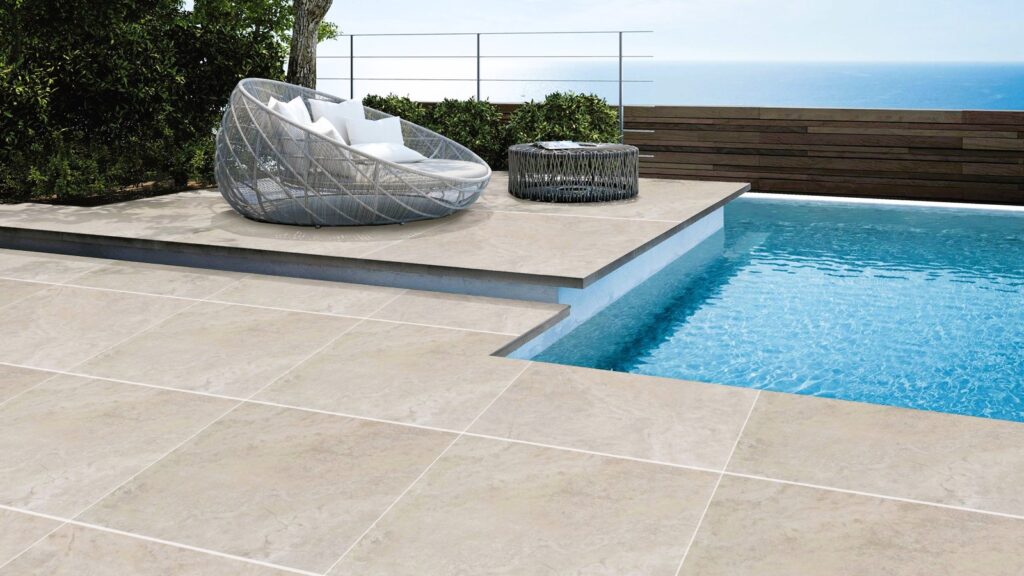
Versatility
Pool porcelain pavers not only provide exceptional durability and resistance to outdoor elements but also offer a vast array of design options to transform your pool area into a stunning and inviting space. With a wide range of colors, patterns, and textures available, these pavers present endless design possibilities.
Pool porcelain pavers come in a diverse selection of colors, ranging from earthy tones to vibrant hues. Whether you prefer a classic and timeless look with neutral shades or want to make a bold statement with vibrant colors, there is a color palette to suit every design preference.
The versatility of color options enables homeowners to seamlessly blend the pool area with the surrounding landscape or to create a visually striking contrast that highlights the pool as a centerpiece.
One of the remarkable features of pool porcelain pavers is their ability to mimic the appearance of various materials, including natural stone, wood, or concrete. Advanced manufacturing techniques and digital imaging technology allow for the creation of pavers that replicate the textures, grains, and patterns found in these materials.
Installation of Pool Porcelain Pavers
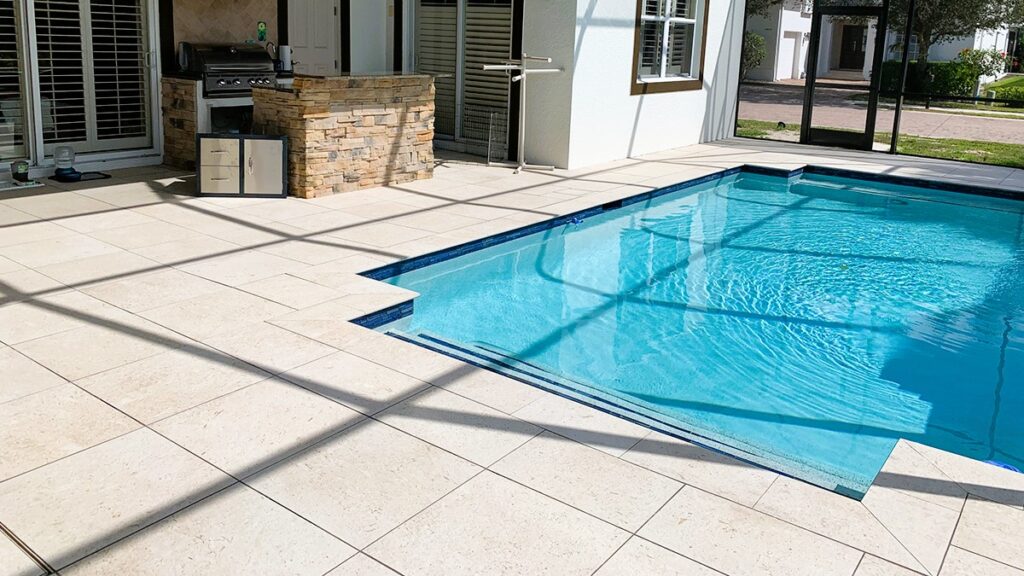
As you can see, pool porcelain pavers have many tremendous benefits, proving that they are the best choice for a pool setting you can find in hardscape design today.
The right installation techniques are extremely important when it comes to a poolside project, particularly when it comes to porcelain pavers. Therefore, when you combine the two, DIY is not an option – you need to hire a hardscape professional.
Here at JS Brick, over our 23 years of experience, we have seen many people try to tackle their poolside installations from a DIY perspective only to be met with challenges they couldn’t handle, having disastrous consequences in the final product.
You don’t want that to be you, right? That’s why we always recommend hiring a professional hardscape contractor in your area you can trust.
And if you happen to be around our area of activity – the Sarasota County, in FL – we can gladly offer that help for you. Get in contact right now for an estimation on your project and start your project today.

